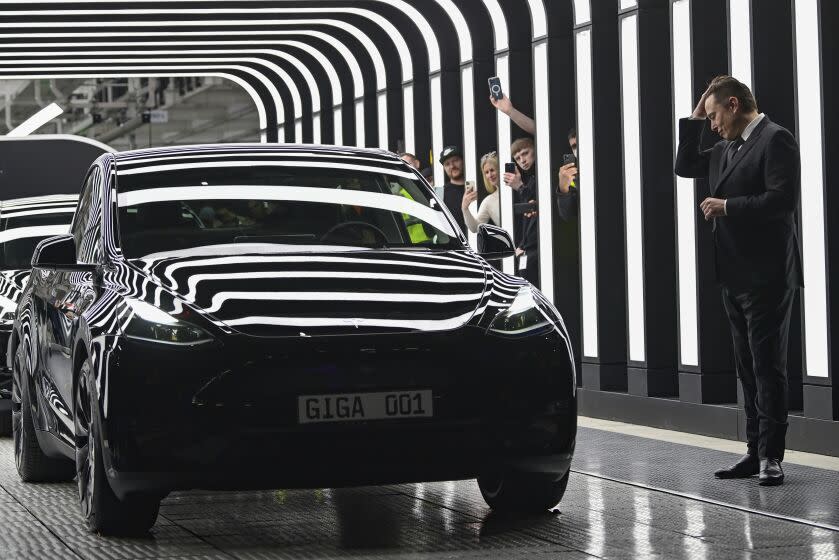Op-Ed: I bought a Tesla to help the environment. Now, I'm embarrassed to drive it

A few years ago, I bought a used Tesla, not because I’m a car nut but because I had been a hypocrite. For years, I had been outspoken about the dangers of carbon emissions. Yet at the same time, I was driving an old gas-powered heap that got about 25 miles per gallon, and that sounded like a rocket launch every time I turned on the ignition.
The car was impractical, but it had sentimental value. My environmental activist friends were not impressed by my assiduous urban composting, LED bulb installations and energy-saving appliances. I needed to do more to diminish my carbon footprint. The icebergs were melting, my friends said, and at least one polar bear was wandering around homeless and hungry because of me.
Many insisted that Teslas were the best for the environment. Pricey but worth it. So I said goodbye to my gas guzzler and made the leap.
Someone once said that Teslas are smartphones on wheels, so for an adult like me who suffers from technical issues, sitting in the driver’s seat for the first time was like trying to master calculus after failing algebra. Where was the ignition? How do you make the thing move? What’s a fob? It took a few weeks to figure out the essentials, but I started to feel some real affection for the car’s sleek design and bells and whistles. But that feeling was short lived.
Because of the recent revelation of Elon Musk’s political views — all of which I abhor — I’m starting to worry about what sort of political statement the car is making. Will people see me as a symbol of right-wing environmentalism, a living oxymoron?
When I bought the car, I had no real opinion on Musk’s somewhat clouded political beliefs. Now that Musk has apparently swung to the far right — banning journalists from Twitter while reinstating neo-Nazis — I’m horrified to be associated with his brand whenever I drive anywhere.
What is Musk up to with this acquisition and destruction of Twitter? Publicity? Political power? It’s certainly not a financial strategy. If there’s one demographic that is unlikely to buy a Tesla, it’s the climate change deniers and anti-science voices he’s been cozying up to.
Musk has turned Twitter into an unsupervised playground for neo-Nazis and other random hatemongers and wackadoodle QAnon followers, embraced everything Trumpian and responded tepidly to Kanye West’s outrageous flirtation with Hitler. As if all that weren’t enough, Musk’s heartless treatment of his Twitter employees — a pre-Christmas firing with no severance pay — was downright Dickensian.
Given Musk’s political descent into the dark side, I wonder whether I should sell my Tesla as a form of protest. How would that adversely affect Musk? Not at all, really. The sale of a used Tesla would hardly cause a blip for the company. Even if I were part of a vast movement, and many other politically aware would-be Tesla owners opted for other, newer EVs, would a blow to Tesla stock really change anything about Musk’s politics? There would be collateral damage. How many people would lose their jobs if people stopped buying Teslas?
I don’t know whether to sell, but I do know that I’m just not as comfortable driving it anymore.
It’s a beautifully designed car with no carbon emission, and initially, I was proud of owning it and being seen driving a vehicle that displayed my concern for the environment. But I’m a liberal, and if Musk’s politics don’t change radically for the better, driving a Tesla will become, at least for me, as hypocritical and untenable as driving a gas guzzler was.
John Blumenthal is a former magazine editor. He lives in Santa Monica.
This story originally appeared in Los Angeles Times.

